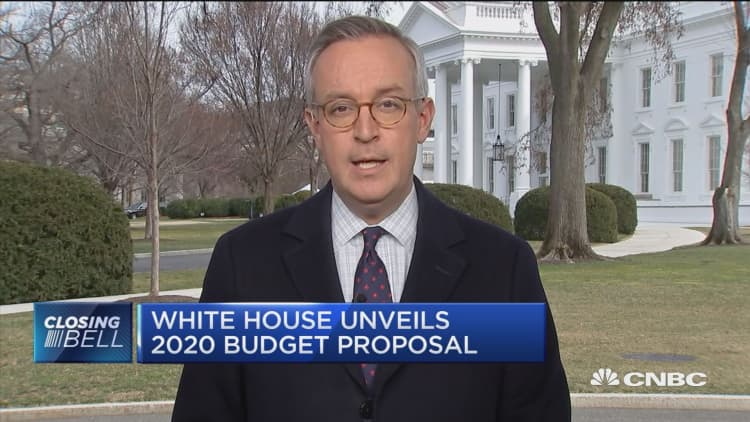President Donald Trump's budget proposal unveiled on Monday would slash funding for the U.S. Education Department by more than 10 percent.
The plan, titled "A Budget for a Better America," requests $62 billion for the Department of Education, or $7.1 billion less than the agency's allowance in 2019.
The budget eliminates subsidized student debt, in which interest doesn't accrue on the loans while borrowers are in school or in economic hardship. It also reduces the number of repayment plans for borrowers and scratches the popular, if challenged, public service loan forgiveness program.

"We have also reaffirmed our commitment to spending taxpayer dollars wisely and efficiently by consolidating or eliminating duplicative and ineffective federal programs," said U.S. Secretary of Education Betsy DeVos.
The plan would narrow the numerous income-driven repayment plans, which caps people's monthly bills at a percentage of their income, to just one. Under that option, students' payments would be limited to 12.5 percent of their discretionary income, compared with 10 percent now.
Any remaining debt would be canceled after 15 years for undergraduate students, and 30 years for graduate students.
The federal work study program, which provides part-time jobs for undergraduate and graduate students with financial need, would also face cuts. Pell Grants would be expanded to cover short-term training programs, a priority of the administration.
"As college remains more crucial for economic opportunity than ever before and costs continue to rise, these proposals move in the exact opposite direction that students and our economy need," said James Kvaal, the president of The Institute for College Access & Success.
WATCH: Why college is so expensive in America

The public service loan forgiveness program is eliminated in the proposed budget.
That program, signed into law by President George W. Bush in 2007, allows not-for-profit and government employees to have their federal student loans canceled after 10 years of on-time payments. The Consumer Financial Protection Bureau estimates that up to one-quarter of American workers could be eligible.
"Eliminating public service loan forgiveness will hurt members of the U.S. Armed Forces, police, fire, EMTs and other first responders," said Mark Kantrowitz, the publisher of SavingForCollege.com. "It will also reduce the number of people pursuing careers in public interest law, such as public defenders and prosecutors."
Congress has rejected Trump's previous budget proposals to cut funding for the Education Department. Now that the House is controlled by Democrats, the administration may only find it harder to realize its requests.
More from Personal Finance:
Here's what you need to qualify for public service loan forgiveness The government may forgive your student loans if you meet these demands
Education Department is failing to provide public service loan forgiveness, senators allege



